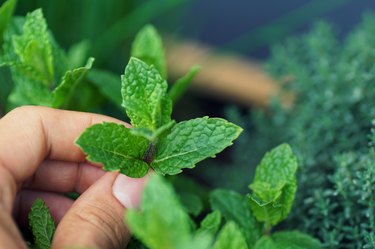
Avid gardeners probably know that there are many plants and herbs that can help naturally deter pests. There are plants and bushes that can help turn deer and other wildlife away from your vegetable garden, alongside several plants and herbs that contain oils that can help repel mosquitoes and other insects. Mosquitoes are some of the most irritating garden pests, but a carefully planted garden can make your time outdoors much more enjoyable.
Plants That Repel Insects
Video of the Day
There are many hardy garden favorites that can help keep your outdoor workspace bug-free. These plants that repel insects produce a family of chemicals called terpenes or terpenoids, which help produce parts of strong aromas. These chemicals include familiar oils like citronellol, menthol, limonene and thymol. Geranium, rosemary and lavender oils have also been noted as effective in repelling bugs. Some of these chemicals can be harmful to insect larvae, so its scent serves as a warning signal that makes bugs turn away and go find food elsewhere.
Video of the Day
Some of the most effective herbs that deter pests include mint (Mentha, which grows in USDA zones 3 to 8). Most gardeners are familiar with the smell of menthol, which is the active ingredient in the leaves of a mint plant. Mint comes in a number of varieties. Spearmint and peppermint plants are the most common types of mint to keep away mosquitoes; other types of mint may be able to reduce the presence of ticks and fleas.
In addition, the oil that produces the familiar, comforting scent of lavender (Lavandula, which grows in USDA zones 5 to 9) smells dangerous to mosquitoes. This purple plant will attract bees and other healthy pollinators while keeping most other insects away. Most gardeners grow basil (Ocimum basilicum, which is grown as an annual) for its rich, fresh flavor. However, basil leaves contain four of the six best volatile terpenes known to repel mosquitoes. Finally, lemon eucalyptus (Corymbia citriodora, which is grown as an annual) is the only naturally occurring oil recommended by the Centers for Disease Control and Prevention for use in areas where mosquitoes may carry diseases.
Using Plant Oils to Repel Bugs
If your yard normally suffers only from light insect presence, you may be able to get away with a very basic application of these oils. Select a few healthy-looking leaves from your plants and bruise them between your fingertips until you can smell their aromatic oils.
Continue to work the leaves with your fingernails and apply the oils to the skin at your neck, wrists and ankles. If you're growing a few varieties of bug-repellent plants, you may want to apply more than one.
Creating a Bug-Repellant Spray
In some cases, you may need a more concentrated form of these essential oils mixed into a spray that may have more staying power. However, you can't just mix these oils with water. Instead, try mixing them with a bit of witch hazel to create a liquid. Your best bet may be to look for a commercial-grade product based on one of these naturally occurring chemicals that's been made safe for use.
Remember that while the CDC has good things to say about these oils, if you're in an area where mosquitoes are known to carry serious diseases, you'll be safest using an insect repellent containing DEET or a comparably strong chemical for your own protection.